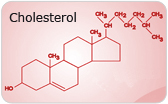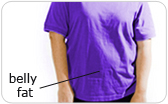
While testosterone is often considered to be mainly a male sex hormone, women also produce it in small quantities. In fact, testosterone is a vital component of female sexual health as well. If your testosterone levels are low due to menopausal hormonal fluctuations, there are lifestyle changes that you can make to improve them, mainly dietary modifications. One of the first things you can do is educate yourself about the benefits of cholesterol and how this fatty substance can boost your hormone production.
The body takes in or produces cholesterol and adds other molecules and enzymes in order to turn it into testosterone. But this is just the beginning of a complex story. Keep reading to learn more about fat, testosterone and their connection to menopause.
What Are the Best Sources of Cholesterol?
In general, animal flesh (such as red meat) and dairy products are excellent sources of cholesterol. However, when altering your diet, it's essential to differentiate between healthy fats and unhealthy fats. The type of cholesterol you will want to increase in your diet will be the kind you get from unsaturated fats. Foods like nuts, yogurt and avocadoes contain high levels of monounsaturated fat and can be beneficial in this instance.
Testosterone and Body Fat

Within the human body, testosterone and fat have a dynamic relationship. For instance, during menopause many women with lower than normal testosterone levels find that they experience weight gain, especially around the midsection. One of the effects of low testosterone is an increase in belly fat. This is because testosterone increases the amount of beta receptors, or messengers that tell your body to burn fat. If you have lower testosterone, you also have fewer of these messengers to promote and maintain fat loss.
In an interesting twist, this excess belly fat may even accelerate your body's production of estrogen, which has an inhibiting effect on testosterone.
Dr. Michael Aziz highlights in his book, the perfect 10 diet: 10 Key Hormones that hold the secret to losing weight, that consuming good fats can help your body rid itself of the bad ones. According to Dr. Aziz, maintaining a low-fat diet that typically lacks adequate cholesterol can inhibit your ability to gain lean muscle mass. This can be detrimental to your health because muscle mass actually helps decrease body fat.
Recommendation
If have a low sex drive, feel depressed, or have been diagnosed with osteoporosis, you may be experiencing testosterone deficiency. Click the following link to read more about low testosterone levels during menopause.